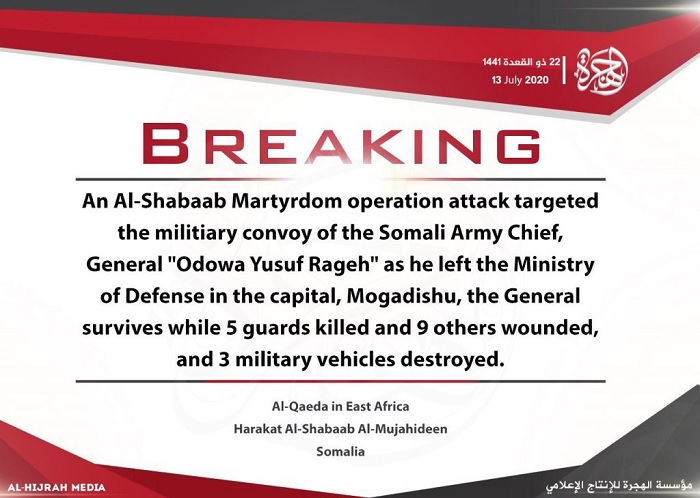
Earlier this week, Shabaab, al Qaeda’s branch in East Africa, attempted to assassinate Somalia’s top general in Mogadishu in a suicide bombing. The attack is the latest in a series of strikes against Somali government officials across the country in recent months.
On Monday, Somali General Odowaa Yusef Rageh, the country’s Chief of Defense Forces, was targeted in a suicide car bombing in Mogadishu. As confirmed by Harun Maruf of Voice of America, Rageh’s convoy was targeted as it left Somalia’s Ministry of Defense.
The car, which was parked, then tried to intercept the convoy. Local reporting has added that members of Rageh’s security team opened fire on the car shortly before it detonated.
While Rageh survived the assassination attempt unscathed, his driver and one member of his security team were injured. Shabaab, through its Shahada News Agency, was quick to claim the blast though it offered little additional detail compared to what has already been reported.
Similar to other attacks that were not particularly successful, Shabaab exaggerated the success of Monday’s blast. “Five members of the Somali army commander’s guards were killed and nine others wounded in a martyrdom operation,” the group stated.
The assassination attempt on Somalia’s top general comes after several Somali military offensives in Jubaland and Galmadug and several recent battles in the Hiraan, Lower Shabelle and Bay regions.
In these recent clashes, Shabaab has reportedly lost several senior leaders, including a top-ranking Nepalese foreign fighter. While a US drone strike targeting a Shabaab checkpoint in Lower Shabelle was also reported on July 9, killing one fighter.
It is likely the attempt on Rageh’s life was in retaliation for the several successive Somali offensives.
Recent strikes against Somali government officials
The assassination attempt of Rageh is just the latest in a series of similar attacks against government officials across the country since March of this year. That month, the governor of Nugaal, a region within the semi-autonomous state of Puntland, was killed in a suicide bombing in Garowe.
Two months later on May 17, the governor of Mudug, another region within Puntland, was killed in a similar attack. On June 3, the district commissioner for the Burdhubo district of Somalia’s Jubaland state narrowly survived an assault on his offices.
And on July 5, a lawmaker within the local Hirshabelle state administration was kidnapped and executed by Shabaab near the town of Jowhar in the Middle Shabelle region.
In addition to these confirmed attacks on government officials, Shabaab has also claimed several other instances against local officials that have so far yet to be independently verified. For example, a local government official in Mogadishu was purportedly assassinated on June 14.
A week later, Shabaab allegedly attempted to kill five local members of the Hirshabelle state government in an IED. An attack on government officials in the region was not reported in that specific timeframe, however.
On June 30, Shabaab claimed it targeted the convoy of Somalia’s Prime Minister Mohamad Abdullahi Farmajo with an IED in Mogadishu. While the purported IED on Farmajo’s convoy was not confirmed, mortars were indeed fired into Mogadishu stadium shortly after Farmajo left the premises.
Then on July 2, a disability rights advocate was assassinated by Shabaab in Baidoa. The al Qaeda branch has since attempted to justify the murder by alleging the man secretly worked for Somali intelligence, though local residents have since disputed Shabaab’s accusation.
Influx of suicide bombings
Monday’s suicide bombing also continues the recent spate of suicide bombings in Somalia, as Shabaab has perpetrated at least six such attacks since May.
In addition to the aforementioned suicide bombing on Mudug’s governor on May 17, Shabaab conducted a suicide assault in Mudug’s Bacaadweyn on June 21. On the same day, Shabaab attempted to detonate another suicide car bomb in Galkayo, but Somali security forces thwarted that bombing.
Two days later, Shabaab targeted the Turkish military base in Mogadishu with a suicide bombing, killing two people. While on July 4, another suicide bomber detonated near a tax center in Mogadishu, which injured five police officers.
Despite some setbacks in recent years, Shabaab continues to be one of Al Qaeda’s most effective branches. It maintains significant control over much of southern Somalia and retains the ability to strike in Mogadishu, Kenya, and against heavily fortified bases in both Somalia and Kenya.
Though its fortunes have ebbed and flowed over the past decade, it has weathered numerous offensives from an array of local, regional, and international actors, including the United States.
